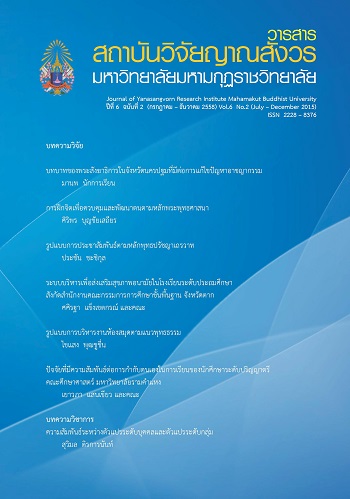Factors Related to Self-Regulated Learning by Undergraduates at the Faculty of Education, Ramkhamhaeng University
Main Article Content
Abstract
In this thesis, the researcher examines perceived self-efficacy, achievement motivation, anxiety, and self-regulation in learning evinced by selected undergraduates. The researcher compares self-regulation in learning by these students with differences in grade point average and year of study. Moreover, the researcher investigates. The relationships of factors affecting self-regulation in learning by the students under consideration. Using the multistage random sampling method, the researcher selected a sample population consisting of 403 undergraduates studying in the first to fourth years. Data were collected using a questionnaire. The researcher analyzed the data in terms of mean, standard deviation and one-way analysis of variance (ANOVA). Pearson’s product moment correlation coefficient method and multiple regression analysis were also employed by the researcher. Findings are as follows: The students under study exhibited self-regulation in learning, achievement motivation and Anxiety found at the low. Perceived self-efficacy showed a moderate. In comparing self-regulation in learning evinced by the students under investigation with differences in average grade point level and year of study, the researcher found the following: Differences in average grade point level did not show differences as compared with all variables. Differences in the year of study paralleled differences in the variable of achievement motivation for second and third year students. In studying the relationships between factors affecting self-regulation in learning by the students under investigation, the researcher found the following: The multiple correlation coefficient for the relationships between perceived self-efficacy, achievement motivation, anxiety and self-regulation in learning was found to be .478 at the statistically significant level of .05. The variables were explanatory of variance in self-regulation in learning at 22.30 percent. The regression coefficient (b) expressed at the statistically significant level of .05 was determined to hold in regard to the variables of achievement motivation (X2) and perceived self-efficacy (X1) with regression coefficients at .441 and .107, respectively. The predictive equation for self-regulation in learning containing the variables of perceived self-efficacy (X1), achievement motivation (X2), and anxiety (X3) can be framed raw score equation and standard score equation as follows: ,
Article Details
References
รังรอง งามศิริ. (2540). การวิเคราะห์ความสัมพันธ์เชิงสาเหตุของตัวแปรที่มีผลต่อความวิตกกังวลในการสอบของนักเรียนชั้นมัธยมศึกษาปีที่ 6 กรุงเทพมหานคร. วิทยานิพนธ์ครุศาสตรดุษฎีบัณฑิต จุฬาลงกรณ์มหาวิทยาลัย.
สำนักงานคณะกรรมการการศึกษาแห่งชาติ. (2544). แนวทางการปฏิรูปการศึกษาระดับอุดมศึกษาตามพระราชบัญญัติการศึกษาแห่งชาติ พ.ศ. 2542. กรุงเทพฯ: สำนักงานเลขาธิการสภาการศึกษา.
อวิรุทธ์ ผลทรัพย์. (2551). การศึกษาความสัมพันธ์ระหว่างปัจจัยบางประการกับความคิดเชิงบวกของนักเรียนชั้นมัธยมศึกษาปีที่ 3 ในเขตพื้นที่การศึกษานนทบุรีเขต 1. ปริญญานิพนธ์ ปริญญามหาบัณฑิต สาขาการวิจัยและสถิติทางการศึกษา มหาวิทยาลัยศรีนครินทรวิโรฒ.
Pintrich, P. R., & De Groot, E. V. (1990). Motivational and self-regulated learning components of classroom academic performance. Journal of Educational Psychology, 82(1), 33-40.
Weiner, B. (1972). Attribution theory, achievement motivation, and the educational process. Review of Educational Research, 42(9), 203-215.

